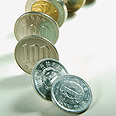
Illustration
Photo: Index Open
Meddling in Syria
by foreign powers risks stirring up a hornets' nest of bloodshed and instability in the Middle East
which could shock markets and derail the weak global economy, China's
top newspaper said on Thursday.
The commentary in the People's Daily, the mouthpiece of the ruling Communist Party, comes in the face of criticism from the West and many in the Arab world over China's and Russia's veto of a UN resolution calling for Syrian President Bashar Assad to quit over an 11-month-old crackdown.
Doing Business
Calcalist reporter
US maintains its lead as Israel's largest export destination in first nine months of 2011, Turkey climbs from seventh to sixth place, India falls from fourth to ninth place
China said it was simply trying to prevent more violence in Syria and has sent envoys to the region to explain its stance.
"The political ecology in the Middle East is extremely frail, a tangled mess of thousands of years of ethnic and religious conflict," the People's Daily said.
World powers must realise this and handle bloodshed in Syria and Middle East tensions with a sense of realism, the paper said, noting that the spread of conflict would be a "catastrophe" in a crucial phase of global economic recovery.
"The Middle East is the world's most important fuel depot. If gripped by chaos, oil prices would skyrocket, shocking the stock market, financial systems and economies," the paper said.
A weak political equilibrium in the region has emerged, but if broken, all manner of latent problems will emerge which no single superpower can control, the paper said.
The author used the pen name "Zhong Sheng", which can mean "voice of China" and is often used to give Beijing's position on foreign policy.
The People's Daily said Washington's aim was to establish a friendly government in Syria to counter the influence of its "old enemy" in the region, Iran.
"Once Syria sets up a pro-Western regime, Iran will lose important backing in the region," it wrote.
Chinese Premier Wen Jiabao vowed this week to work through the United Nations to seek an end to the strife, but a senior official traveling with Vice President Xi Jinping in Washington warned that missteps by the United Nations could worsen bloodshed.
Assad on Wednesday promised a referendum in two weeks on a new constitution leading to elections within 90 days, but made clear he was still intent on crushing the uprising with tanks and troops. Opposition figures spurned the referendum offer.















